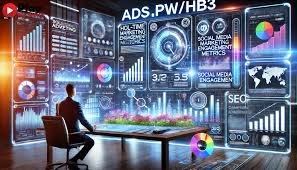How AI Will Run the Digital Marketing Industry in 2025

As we step into a new era of digital marketing, artificial intelligence (AI) is set to revolutionize how brands connect with consumers. By 2025, AI will not only enhance marketing strategies but also redefine customer experiences, making them more personalized and efficient. In this article, we’ll explore the pivotal role AI will play in shaping the future of digital marketing, highlighting key trends and technologies that marketers should embrace.
The Power of Hyper-Personalization
In 2025, hyper-personalization will be at the forefront of digital marketing strategies. By leveraging AI to analyze vast amounts of data, brands can create tailored experiences that resonate with individual consumers. This goes beyond simply addressing customers by their names; it involves understanding their preferences, behaviors, and purchasing patterns.
Imagine receiving product recommendations that perfectly match your tastes or personalized messages that arrive at just the right moment. With AI-driven insights, brands can engage their audience more effectively, leading to higher conversion rates and improved customer satisfaction.
Content Creation: The AI Revolution

Content remains king in the digital marketing realm, but creating high-quality content consistently can be a daunting task. Enter AI-powered tools that can generate articles, social media posts, and even videos based on specific prompts. By 2025, we can expect these technologies to become even more sophisticated.
Marketers will increasingly rely on AI to produce diverse content variations quickly. This allows for rapid experimentation with different messaging strategies, enabling brands to identify what resonates best with their audiences. As a result, companies can maintain a consistent online presence while optimizing their content for maximum engagement.
Voice and Conversational Marketing
With the rise of voice-activated devices and chatbots, voice and conversational marketing will become integral components of digital strategies by 2025. AI-powered chatbots will handle customer inquiries in real-time, providing instant support and personalized recommendations based on user data.
Moreover, optimizing for voice search will be crucial as more consumers use voice commands to find products and services. Marketers must adapt their SEO strategies to ensure their content is easily discoverable through voice queries. By leveraging AI to analyze voice search patterns, brands can enhance visibility and connect with customers in innovative ways.
Predictive Analytics: The Crystal Ball
Predictive analytics is set to transform how marketers make decisions. By analyzing historical data and identifying trends, AI can forecast future consumer behavior and market conditions. This capability allows businesses to make informed decisions about campaign strategies, budget allocation, and product development.
In 2025, companies utilizing predictive analytics will gain a competitive edge by anticipating customer needs before they arise. For instance, retailers can optimize inventory levels based on predicted demand fluctuations or tailor marketing campaigns to target specific segments during peak buying seasons.
Enhanced Marketing Automation ⚙️
AI-driven marketing automation tools are revolutionizing campaign management. These tools can automate repetitive tasks such as email marketing, social media posting, and A/B testing. By leveraging machine learning algorithms, marketers can optimize campaigns in real-time based on performance metrics.
In 2025, we can expect more advanced automation features that allow for dynamic adjustments based on user interactions. For example, if a customer opens an email but doesn’t click through to the website, AI could trigger a follow-up message with additional incentives or personalized recommendations.
Ethical Considerations: Building Trust

As AI becomes more prevalent in digital marketing, ethical considerations surrounding data usage and privacy will come to the forefront. Consumers are increasingly concerned about how their data is collected and utilized by brands. Marketers must prioritize transparency and ethical practices when implementing AI technologies.
By 2025, businesses that prioritize ethical AI practices will build stronger relationships with their customers. Implementing clear data usage policies and providing users with control over their information will foster trust and loyalty.
Social Listening: The Voice of the Customer
Social listening involves monitoring online conversations about a brand or industry to gain insights into consumer sentiment and preferences. In 2025, social listening powered by AI will become an essential tool for marketers seeking to understand their audience better.
AI algorithms can analyze vast amounts of social media data in real-time, identifying trends and emerging topics relevant to a brand’s target market. This information allows marketers to adjust their strategies proactively, ensuring they remain relevant in a rapidly changing digital landscape.
Augmented Reality (AR) and Virtual Reality (VR) Integration
As technology advances, the integration of augmented reality (AR) and virtual reality (VR) into digital marketing strategies will become more prevalent. These immersive technologies offer unique opportunities for brands to engage customers in innovative ways.
By 2025, we can expect brands to leverage AR and VR for product demonstrations, virtual try-ons, and interactive experiences that enhance customer engagement. By combining these technologies with AI-driven insights about user preferences, marketers can create personalized experiences that resonate deeply with consumers.
Conclusion: Embracing the Future of Digital Marketing
As we approach 2025, it is evident that artificial intelligence will be at the forefront of the digital marketing industry’s evolution. From hyper-personalization and content creation to predictive analytics and ethical considerations, AI will reshape how brands connect with consumers.
To thrive in this dynamic landscape, marketers must embrace these technological advancements while maintaining the human touch that fosters genuine connections with their audience. By integrating AI into their strategies thoughtfully and ethically, businesses can unlock new opportunities for growth and success in the ever-evolving world of digital marketing.
In summary, those who adapt early to these changes will not only survive but thrive in the future of digital marketing driven by artificial intelligence!



